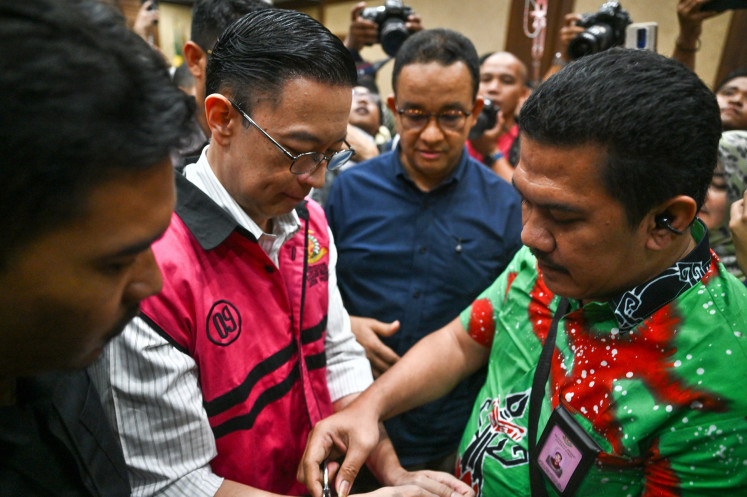Popular Reads
Top Results
Can't find what you're looking for?
View all search resultsPopular Reads
Top Results
Can't find what you're looking for?
View all search resultsLooking back at the history of election supervision in Indonesia
Modern politics in Indonesia dates back to 1955 when the country had its first general election
Change text size
Gift Premium Articles
to Anyone
M
odern politics in Indonesia dates back to 1955 when the country had its first general election. Despite being regarded as democratic, the 1955 election went ahead without any form of supervision.
It was not until 1982 that general elections were finally supervised by an ad hoc institution, called the Election Supervisors (Panwas). The decision to create such a supervising institution was made following public uproar over rampant violations and manipulations allegedly committed by election organizers in the preceding 1971 and 1977 general elections.
Besides being plagued with irregularities, the 1971 election was also far from democratic. Soeharto introduced the 'floating mass' concept that banned political parties from operating at village level.
The Golkar Party, which served as Soeharto's main political machine throughout the New Order regime, ran in the 1971 general election against nine other political parties and won 62 percent of the vote.
In 1973, Soeharto forced all political parties to merge into three: Golkar, the United Development Party (PPP) and the Indonesian Democratic Party (PDI).
During his three-decade-long administration, Soeharto tightly controlled politics; with little room available for opposition and many of those who criticized the elections ending up behind bars.
Golkar consistently won more than 70 percent of the vote, and if its share fell below 73 percent, the party's board fell into disfavor with Soeharto, who was Golkar's chief patron.
There was even an occasion when the results of the election in the province of Lampung leaked out days before the election was actually held. When the official results were announced after the election, they were indeed the same as those that had circulated before.
The protests against election results grew even louder after even more widespread cheating occurred in the 1977 election.
In response to the protests, the government and the House of Representatives, which were dominated by Golkar and the military at that time, came up with the plan to improve the existing election regulation to boost the quality of the 1982 election. The improvements were demanded by the PPP and the PDI.
The government then agreed to put representatives of election participants on the election-organizing committee. The government also established a separate institution from the General Elections Institution (LPU), called the General Elections Implementation Supervisory Committee (Panwaslak Pemilu).
As the name suggests, the committee was tasked to monitor any irregularities during elections. The committee was still active in the 1999 election, albeit with a new name, the General Elections Supervisory Committee (Panwaslu), and with a new organizational structure and working mechanism.
The country's efforts to ensure fair democratic elections through quality supervision were once again overhauled by Law No. 12/2003. The law stipulates that election monitoring be conducted by Panwaslu at four levels. The first being the central Panwaslu; the second Panwaslu's provincial branches; followed by regency or municipality branches and then the sub-district level.
According to political analyst Ramlan Surbakti of Airlangga University, the quality of the country's election supervision has been steadily rising. 'During the New Order era, there was already an attempt to supervise elections, but it was just like that [with no clear regulation]. When we entered the reform era, there was already a law which gave authority to the Supreme Court to establish Panwaslu,' Ramlan, who was a member of Panwaslu during the 1999 election as well as a former member of the General Elections Commission (KPU), which replaced the LPU, told The Jakarta Post.
There already was a law regulating Panwaslu in the 1999 election, however, it was not comprehensive enough, according to Ramlan.
Ramlan added that during the 2004 general election, the supervisory body was getting stronger as it had become a legal channel for the public to file reports should they find any violations during elections.
In the 2009 general election, Panwaslu was renamed Bawaslu, with a separate budget from the KPU, albeit with the same authority as Panwaslu. Finally, for the 2014 election, the government increased Bawaslu's authority in monitoring the election by making the provincial branches of Bawaslu permanent. In line with its increased authority, Bawaslu is now also able to settle election disputes.
However, Ramlan said, the existence of Bawaslu had apparently discouraged public participation in monitoring the election.
'The existence of Bawaslu has actually killed off public participation,' he said. 'On top of that, there are already other institutions, such as the police and the KPU, that can receive and follow-up on reports from the public regarding election violations.'
' JP/Hans Nicholas Jong










